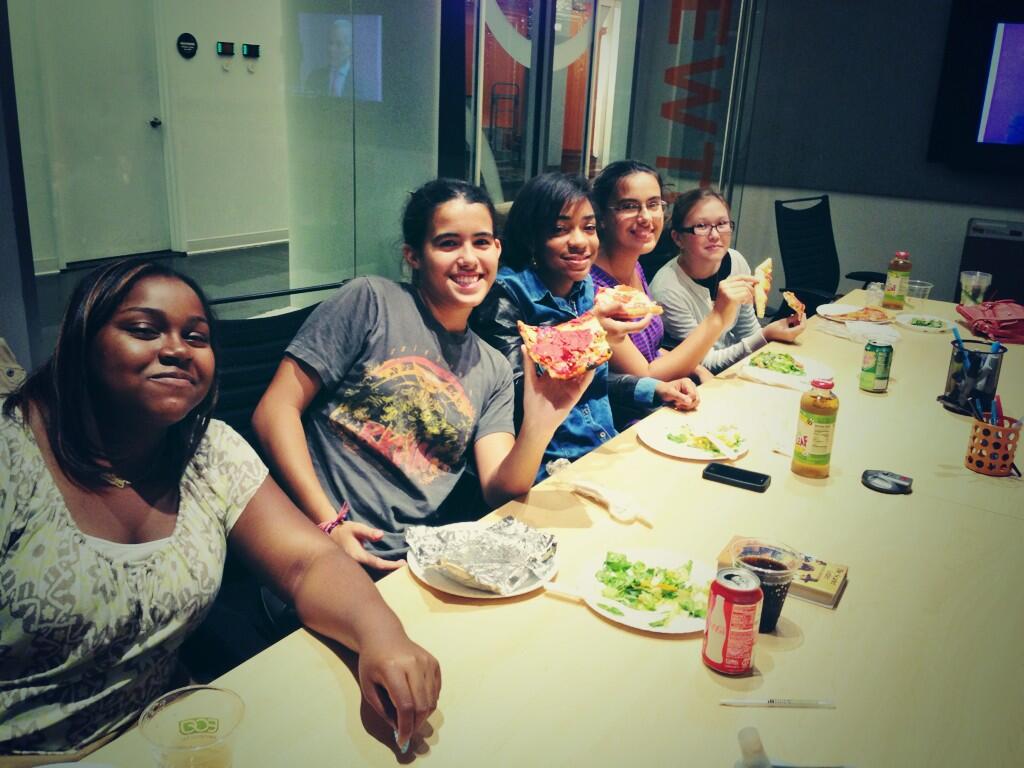Girls Who Code (GWC), a New York City-based nonprofit seeking to close the gender gap in technology, is set to launch a set of coding clubs in Philadelphia public schools this month: Six schools across the city will now offer the six-week, after-school coding program to any girl and/or feminine-presenting person interested in exploring careers in computer science and technology.
While the seven-year-old, Reshma Saujani-founded nonprofit has nearly 300 clubs currently established across the state — including a few locally, such as a year-old club at Mitchell Elementary School in Southwest Philadelphia — and hosted a free STEM immersion camp in the city this summer, this will be the first time the organization will be integrated into Philly public schools through a partnership with another nonprofit.
In this case, the partner organization is Project L.Y.F.T. (Leading Youth for Tomorrow), an out-of-school-time education organization funded by the state’s Department of Education.
Nia Benjamin, Girls Who Code’s regional partnership coordinator of Pennsylvania and Delaware, said it’s imperative to provide resources and career-readiness programs to local schools that don’t have the means or capacity to offer technology-centered programs.
“We have a lot of clubs across the state but they are in really high concentrations in suburban areas,” Benjamin said. “It’s so important to give and redistribute opportunities [while] reconfiguring how we’re providing goods and services to the public schools in the city, especially after the mass closing of Philadelphia public schools in 2013.”
GWC teamed up with L.Y.F.T. to establish coding clubs at Science Leadership Academy Lower School at Beeber, Martin Luther King High School, Tilden Middle School, Bartram High School, Paul Robeson High School and Frankford High School.
Students in grades 6 through 12 will have access to hands-on coding training while learning about women in tech, community building, and how to use what they’ve learned in practical ways to improve their neighborhoods. The programming languages taught include Scratch, Python, Javascript, HTML and Swift.
L.Y.F.T. provides free career-focused after-school and summer programs to schools in predominately poverty-stricken communities that are under-performing and under-resourced. Director of Community Outreach Julian Domanico said it’s crucial for programs like Girls Who Code to be available to these under-resourced schools where many, if not all, of the student population is comprised of students of color.
We’re empowering them to learn how to persevere in a male-dominated field while thinking about how to apply their technical skills to positively impact their community.
“The percentage of women in computer science is incredibly low compared to the number of men in the field, and if we’re talking about equity, people of color have an even lower chance of getting into those kinds of fields,” he said.
According to the National Girls Collaborative Project, women comprise only 18% of the country’s computer science graduates, and GWC indicates that only 24% of women are computer science professionals. Those numbers skew even lower for women of color: Just 10% of U.S. computing degrees go to women of color, and that group makes up less than 3% of Silicon Valley’s tech workforce.
(Philadelphia does relatively well in terms of gender and racial diversity, with women making up 37% of all local STEM employees and people of color making up 42%, according to census data.)
Shantayah Hayes, a site coordinator and the parent engagement and outreach coordinator at L.Y.F.T., will be heading the coding sessions at Bartram High School. She said she’s excited about the “new possibilities for our youth at Bartram to be exposed to STEM in ways they haven’t been exposed to it before.”
“This opportunity will allow many of our students to consider coding as a field that they can actually go into,” Hayes said. “I have students that vary from gamers to athletes to fashionistas. Showing them that coding can be used in every platform can do so much for their ability to broaden their future endeavors.”
Similarly, L.Y.F.T.’s Domanico emphasized the need to create a pipeline of economic opportunities for children growing up in the city.
“We do a good job of attracting new people to Philadelphia and creating channels for them to get into business, government and tech in Philly,” he said. However, “we’re lagging on making sure that Philadelphians who were born and raised here also have pipelines to seats of power, professional life or good paying jobs. We try to do a really thorough job of offering programs focused on work readiness and career exploration.”
While there have been a number of coding clubs similar to GWC that have popped up in Philadelphia — such as TechGirlz and Coded by Kids — Benjamin doesn’t view these organizations as competition but rather an asset in helping to “end gender parity in tech,” she said.
“Girls Who Code is different in that we’re really working to teach young women not only the technical skills needed to pursue college and career opportunities,” Benjamin added. “We’re also empowering them to learn how to persevere in a male-dominated field while thinking about how to apply their technical skills to positively impact their community.”
If you’re interested in starting a Girls Who Code club at your school or nonprofit within the Philadelphia area, reach out to Benjamin at nia.benjamin@girlswhocode.com or apply here.







